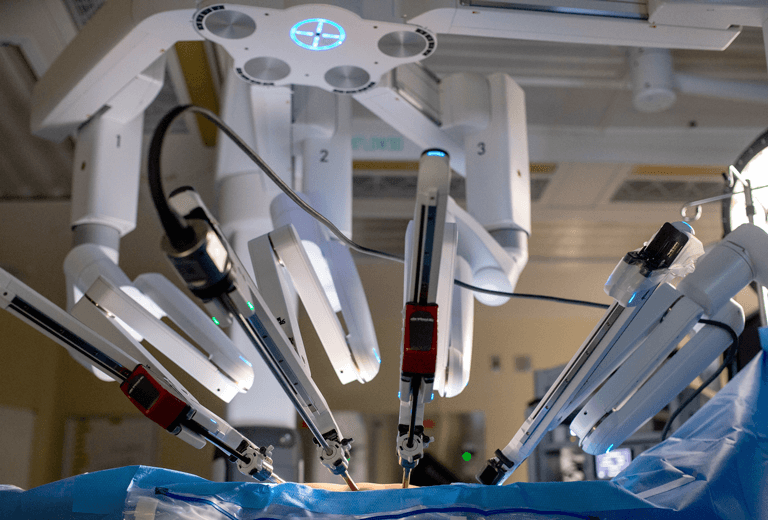Robot-assisted Head and Neck Surgery
Contact Us
(321) 841-9365Request a Consultation
Wondering if robotic surgery is right for you? Request a consultation with one of our surgeons to learn more.
Robotic Resection of Tonsil and Base of Tongue Tumors
Transoral robotic surgery (TORS) is the term for robot-assisted surgery that is performed to remove a tumor from the mouth or throat. TORS is a relatively new approach to remove cancers from areas in the throat that are difficult to access, including the tonsils and base of tongue. Robot-assisted surgery to remove throat cancer can be a highly effective treatment choice when appropriate because of its lower side effects and excellent patient outcomes.
The doctors at Orlando Health Cancer Institute are skilled in robotic procedures utilizing the da Vinci® Surgical System, which offers increased control and precision in the operating room. With robotic tools that offer more flexibility than the human hand, surgeons are able to work safely within a patient’s mouth to remove the cancer from the inside. Robotic surgery for cancers of the throat may avoid the need for chemotherapy and radiation therapy.
In addition, throat cancer patients may also benefit from other advantages of robotic surgery, including less blood loss, less scarring, and faster recovery to normal eating and speaking.
Robotic Obstructive Sleep Apnea Procedures
Obstructive sleep apnea (OSA) is caused by a blockage of the upper airway, most often when the soft tissue in the rear of the throat collapses and closes during sleep. OSA causes shallow or paused breathing during sleep, which can lead to loud snoring, restless sleep, daytime sleepiness, and long-term heart and lung health consequences.
Until now, patients with severe obstructive sleep apnea had relatively few choices in treatment besides lifestyle changes, mouthpieces, breathing devices (CPAP) and traditional invasive surgical techniques.
Transoral robotic surgery for severe obstructive sleep apnea is primarily for patients whose sleep apnea is caused by a large tongue obstruction. Surgery reduces the size of the base of the tongue. Patients who require this procedure are assessed during an in-office examination that includes a sleep study review and examination of tissue obstruction. The procedure may eliminate the need for mouthpieces or breathing devices generally used for sleep apnea treatment.
The robotic procedure is performed entirely through the mouth with a faster recovery than conventional surgery. This procedure requires a 1–2-day hospital stay following surgery. A full recovery takes about 3 weeks compared with 6–8 weeks for conventional open surgery.
For more information or to schedule an appointment with one of our head and neck surgeons, call the Orlando Health Cancer Institute Head and Neck Cancer Center at (321) 841-7171.
*As with any surgical procedure, robotic surgery involves risk, some of which may be similar to the risks of conventional open surgery. Talk to your doctor to decide if robotic surgery is right for you.



